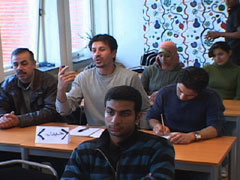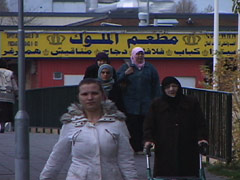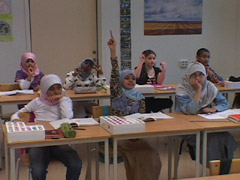In This Episode << SLIDE LEFT TO SEE ADDITIONAL SEGMENTS
Iraqi Refugees in Sweden
DEBORAH POTTER, guest anchor: The war in Iraq has forced millions to leave the country. Most refugees have stayed in the Middle East, but the country outside the region that’s taken in more Iraqis than any other is not the United States. It is Sweden, which had no troops involved in the invasion. As Fred de Sam Lazaro reports, the influx of refugees there is causing concern.
FRED DE SAM LAZARO: Sweden has long prided itself as a humanitarian society with cradle-to-grave welfare benefits. But to the fastest growing segment of its population, this Nordic nation, more than anything else, is safe.
At Friday prayer services in the city of Malmo are refugees from some of the world’s most violent conflicts: Bosnia, Somalia, Afghanistan, and, more numerous nowadays, Iraq.
UNIDENTIFIED MAN (speaking Arabic, through translator): Our topic today is adapting to Swedish life.

DE SAM LAZARO: They are people like Haider Kassam al Tamimi. He left his wife and two small children in Baghdad after being threatened.
HAIDER KASSAM AL TAMIMI (Iraqi Refugee and Auto Mechanic, through translator): I was working for a government ministry in the electricity department. A private American company came in to work with the ministry, and the mujahideen were against the Americans. They sent me a threatening letter because I did not quit my job.
DE SAM LAZARO: Sweden took in some 9,000 Iraqi refugees in 2006, about half of all those who reached Europe or North America. The U.S., by contrast, took in just over 200 Iraqis last year.
TOBIAS BILLSTROEM (Migration Minister): If the U.S. had taken in as many Iraqi refugees as Sweden has done so far per year it would have been approximately 500,000 that the U.S. would have accepted so far, if you compare the amount of the populations.
DE SAM LAZARO: Proportionally?
Mr. BILLSTROEM: Yes.
DE SAM LAZARO: There were recent reports that Sweden planned to clamp down on the number of newcomers. But Dan Eliason, who heads the agency that processes asylum applications, says the basic asylum rule is unchanged.
DAN ELIASON (Swedish Migration Board): If you are individually threatened or tortured or killed or something like that, then you can, of course, have right to stay. I would say that probably we have the world’s most liberal and generous legislation when it comes to asylum matters.
DE SAM LAZARO: About one-fifth of Sweden’s nine million people today come from immigrant stock. Immigration is closely linked to the country’s post-war economic boom. It brought migrants from Yugoslavia, Greece and Turkey and in the 1970s, political refugees from Iran and Saddam Hussein’s Iraq, like Mustafa Diner. Today he co-owns a halal butchery whose soaring sales mirror the new demographics: $20 million a year of meat slaughtered according to Muslim custom.
MUSTAFA DINER (Businessman, through translator): We began in 1995 with four employees, including myself. Now we have 27 and could get much larger if we had more space. People want halal meat. The business has grown steadily.
DE SAM LAZARO: The steady recent growth of Sweden’s refugee population may be good for business, but it drew concern from people we talked to, even as many like the idea of Sweden as safe haven.
 BRITT NORDEBRINK: I think it’s quite good but maybe we have difficulties in taking care of all of the refugees because they have so many problems. They have head [wounds] and so then they come to Sweden and they need psychological help.
BRITT NORDEBRINK: I think it’s quite good but maybe we have difficulties in taking care of all of the refugees because they have so many problems. They have head [wounds] and so then they come to Sweden and they need psychological help.
GUN EDSTROEM: Perhaps it’s too many.
Ms. NORDEBRINK: Because we can’t take care of all of them.
DE SAM LAZARO: Are there too many here already?
Ms. NORDELBRINK: Yes, I think so.
ROBIN TRAVIS: You make sure that they get jobs, they get somewhere to live, and they get a place in Swedish society. Otherwise you create a problem.
DE SAM LAZARO: Others see problems. They link immigration to increased crime.
ULF WISTROEM (through translator): Unfortunately, we have imported a lot of crime from different countries. The immigrants that commit crimes make all the other immigrants look bad. This problem has made the right wing party get a lot of votes. We should accept less immigrants. We’re taking too many Iraqis, and it’s hard on our economy.
DE SAM LAZARO: Some refugee advocates say newcomers should get on-the-job training as well as the classroom learning and welfare benefits they already receive. Farbod Rezani, who works for an industry trade association, was himself a refugee in the early ’80s from the Iranian revolution. He struggled to find a job, he says, thanks to misguided if well-meaning policies toward refugees.
FARBOD REZANI: We don’t see people as ambitious people who want to make a living and to contribute something to the society, to their new home. We rather see them as victims — people who need to be taken care [of], you know. I didn’t come here to be a refugee.
AL TIMIMI (through translator): It’s hard to feel integrated. We don’t have the language.
DE SAM LAZARO: Haider al Tamimi, an auto mechanic, is frustrated no one will hire him until he can speak Swedish. He’s forced to crowd in with three others in a small apartment, amid an acute shortage of public housing. But for every story like his, some Swedes say they hear about others who don’t want to integrate.
PETER FRANKEL (Business Consultant): There are those who miss their homeland so much that they stay in their misery. In their mind, they stay there. You can see that clearly in the way they dress, in the way they insist on keeping their name and in reinforcing that go into conclaves.
DE SAM LAZARO: The conclaves he refers to are immigrant clusters like the Malmo suburb of Rosengard, where Hamid Feyli and his wife Selma Rahim live. They’ve spent 15 years here. He’s well settled in a job as a carpenter, and three of their four children were born here. Still, they say they will never be Swedish.
HAMID FEYLI (through translator): We don’t want to stay here. We are going to our Iraq. Our Iraq is rich. Our Iraq is powerful. We have petrol, agriculture. We have everything. We hope only that the leaders will do the right thing. We hope Iraq will be like Sweden. Actually, it can be better than Sweden.
 DE SAM LAZARO: Complicating Sweden’s integration message is that technically the government still expects refugees to go back.
DE SAM LAZARO: Complicating Sweden’s integration message is that technically the government still expects refugees to go back.
Mr. BILLSTROEM: We want to help people to return home to help to rebuild their country, because if we don’t, Iraq will remain an unstable nation for a very, very long period. And it doesn’t do Iraq any good that the doctors, engineers, the technicians, the bureaucrats, the administrators, even a few politicians sit here in Sweden.
DE SAM LAZARO: But he concedes that repatriation is likely to be years away. That makes retaining the original national identity difficult, especially for the next generation, even in an all- Muslim school.
BEJZAT BECIROV (Director, Islamic Center of Malmo, through translator): In the second generation, it will change. Parents still hold on to these dreams, but the children don’t.
UNIDENTIFIED MAN (singing): If you ask me who my God is, on whose name I call, if you ask me who my God is, he’s the God of us all, Allah the merciful.
DE SAM LAZARO: The approach at this government-funded Islamic school and the larger community center is to forge a new Swedish Islamic identity, leaving behind issues that divided members in their countries of origin.
Mr. BECIROV (through translator): This mosque is not imported. It’s on Swedish soil, a Swedish model so all Muslims should be able to be here. You cannot bring politics from your own countries here. We’re very clear: no politics from other countries, just Swedish politics.
DE SAM LAZARO: Still, his mosque has been firebombed three times in recent years. No one’s sure if it’s xenophobia or Islamic extremists who have condemned the center’s ecumenical approach. Amid the worry, however, there’s still optimism based on Sweden’s mostly positive history with immigration.
Mr. FRANKEL: So there’s a historic understanding or sense that given some time and cooling it, this will be something positive for Sweden. And we need those people in a lot of jobs. I mean, we really do. I think it’s a question of time, and I think there’s a strong consciousness of that, even though, of course, for the moment, perhaps for a couple of years, [it] will be — is tough, and it is irritating.
DE SAM LAZARO: One target of irritation, even resentment from all sides, is the United States.
AL TAMIMI (through translator): They call themselves liberators, but they are occupiers. Because of them these things happened in Iraq, and because of them there is no stability, security and peace in Iraq now. That’s my opinion. It’s because of the occupiers.
Mayor ILMAR REEPALU (City of Malmo): Sweden didn’t take part in the Iraqi invasion. If you look upon the second quarter this year, 4,500 came to Sweden and were accepted here; 2,500 went to Greece; 400 get to Spain and 180 to United States –180. That’s half the number that we accepted in Malmo in the time. How come?
DE SAM LAZARO: The U.S. has promised to sharply increase the number of Iraqis it will admit, but it will still be a fraction of those who will go to Sweden.
For RELIGION & ETHICS NEWSWEEKLY, this is Fred de Sam Lazaro in Malmo, Sweden.

